Prizes
Maremetraggio Section
- Premio Estenergy Best Short Film
- Premio Makinarium Best Short Animation and Visual Effects
- Premio Studio Universal Best Italian Short Film
- Premio Premiere Film Best Undistributed Short Film
- Premio Oltre il Muro Best Italian Short Film awarded by the prisoners of the Trieste District Prison
- Premio Trieste Caffè Best Short Film awarded by the audience
- Premio AMC Best Italian Editing Short Film
- Premio Mercurius Best Jungian Theme Short Film
Nuove Impronte Section
- Premio Hera Comm Best Feature Film
- Premio Bakel Best Feature Film chosen by the audience
- Premio AGICI Best Production
- Premio SNCCI Best Feature Film chosen by the Jury of National Syndicate of Italian Film Critics
- Premio ANAC Best Screenplay
SweeTS4Kids Section
- Premio SweeTS4Kids Best Short Film
Maremetraggio Jury
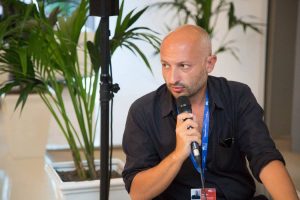
Jacopo Chessa
Jacopo Chessa
Jacopo Chessa (Torino, 1973) majored in film history, working predominantly on the 1950s and 1960s of French cinema. He has published two books and a number of articles; cooperated with the Archivio Nazionale Cinematografico della Resistenza, the University of Torino and the Université Sorbonne Nouvelle – Paris III. In 2010, he founded the production company Prime Bande, which specializes in the history of manufacturing and the workers’ movement. Since 2014, he has been the director of Aiace Nazionale, the first Italian association of art theatres, and of the Centro Nazionale del Cortometraggio (National Short Films Centre), a film archive and agency which promotes Italian short films. Since 2016, he has directed the Torino Short Film Market. He also works as contract professor at Université Sorbonne Nouvelle – Paris III.
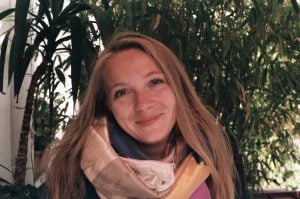
Charlotte Micklewright
CharlotteMicklewright
British film curator and festival coordinator, her research interests include Middle Eastern and North African cinema, their European audiences and short film exhibitions. After obtaining an MSc in Film, Exhibition and Curation from the University of Edinburgh, she worked across the UK in art and festival management, including with one of the biggest literary events in the world, the Edinburgh International Book Festival. As well as serving on Bristol’s Encounters Short Film and Animation Festival’s selection committee, She has curated short film programmes for the Edinburgh International Film Festival, the Scottish Mental Health Arts and Film Festival and the Berwick Film & Media Arts Festival. She has recently moved to Bologna to join the programming team of Biografilm Festival | International Celebration of Life.

Cristina Picchi
Cristina Picchi
Cristina Picchi is an award winning Italian filmmaker, writer and visual artist based in Italy and London. Her films have been screened at festivals and galleries worldwide, winning prizes at festivals such as Locarno, Clermont-Ferrand and Thessaloniki. In 2013 she was nominated for Best Short Film at the European Film Awards. She is the recipient of the residency program at the Museumsquartier in Vienna and the the European Media ART Network. She holds a degree and an MA in European Literature from the University of Pisa and a master’s degree in Screen Documentary from Goldsmiths University of London.
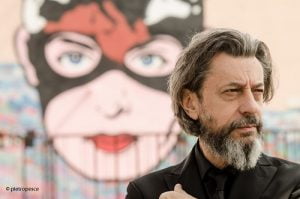
Pivio
Pivio
In 1979 he founded the new wave group Scortilla. Towards the end of the 80’s, after graduating in Electronic Engineering from the University of Genoa, he transferred to Rome and along with Aldo De Scalzi brought life to an artistic fellowship for film music. Gaining international notoriety with Il Bagno Turco, directed by Ferzan Ozpetek, he has also composed more than a hundred soundracks for cinema and television. In 2016 he began his solo career with It’s Fine Anyway, written, played and sung in complete autonomy. It is expected to become a musical film and series by 2018. On the 10th of January 2017, one year after the passing of David Bowie, Pivio released his new solo piece Lodging a Scary Low Hero, which is a tribute to the English musicians’ Berlin period.
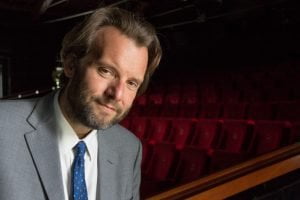
Marco Spagnoli
Marco Spagnoli
Marco Spagnoli graduated with a degree in Philosophy in 1995. He is a critic and cinematic journalist, and for the last 20 years has kept busy with the cinema and show sections of a variety of printed and electronic publications. He is the director of the Italian Giornale dello Spettacolo and collaborates with Vivilcinema, La Rivista del Cinematografo and Globalist. He is also vice director of the Festival di Bari, and was in charge of selections. He was also vice director of the Taormina Festival in 2005 and 2006, as well as vice director of the RomaFictionFest 2007. He was a member of the Experts committee for RomaFictionFest from 2008 and consultant of the Casa del Cinema di Roma. He is also a member of the Sindacato Nazionale Giornalisti Cinematografici Italiani, the Sindacato Nazionale Critici Cinematografici Italiani, the Accademia del David di Donatello and the Federazione Internazionale dei Critici Cinematografici (FIPRESCI).
Nuove Impronte Jury

Alessandro D’Alatri
Alessandro D’Alatri
Alessandro D’Alatri began working in show business at eight years old acting in theatre, cinema and television. His career behind the camera began in advertising towards the end of the 70’s. In 1991 he debuted as a film director with his first feature film Americano rosso with which he won the David di Donatello award and the Ciak d’oro for best cinematic debut of the year. In November 2005 he debuted in theatre direction with the Italian novelty Il sorriso di Daphne by Vittorio Franceschi. In November 2014 he was voted artistic director of the Stabile dell’Abruzzo. Since 1992 he has collaborated with the Centro Sperimentale di Cinematografia with courses in direction, screenwriting and acting. In 2017 he received a honoris causa diploma in Direction from the Centro Sperimentale di Cinematografia in Milan.

Manuela Mandler
Manuela Mandler
Manuela Mandler is a graduate in Scienze della Comunicazione from Trieste University. She lived in Brasil, where she worked at Gullane production company. In the first years, as a Communication and Marketing Director, she was responsible for the release of Brazilian films such as Carandiru, by Hector Babenco and The Year my Parents Went on Vacation, by Cao Hamburger. Since 2007 she has been responsible for the international department at Gullane, coordinating international projects in coproduction such as La terrra degli uomini rossi, by Marco Bechis, an Italy-Brazil coproduction; Tabu, by Miguel Gomes, coproduction between Portugal, France, Germany and Brazil; Amazonia 3D by Thierry Ragobert, a France-Brazil coproduction. Manuela returned to Trieste in 2015 and continues to coordinate the international department at Gullane from Italy.

Marina Marzotto
Marina Marzotto
From 1994-1998, Marina was a producer and advertising photography representative at Cymon Taylor Productions in London. Two years after beginning her collaboration with Ferragamo, where she started working in Marketing, she became director of worldwide communications for the group as a whole. In June 2002, she began setting up Propaganda Italia. She is the network’s spokesperson and looks after business development in Italy, the UK and the Mediterranean area. In 2011, she was the executive producer of the documentary Valdagno, Arizona, which was presented at the Giornate degli Autori of the 68th Venice Film Festival. In the two years from 2012-2013, she was the Director of General Operations at Moviemax. In September 2013, she launched Propaganda Italia’s cine-televisual productions department.
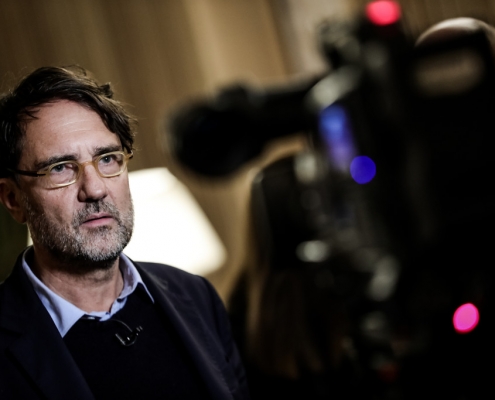
Francesco Ranieri Martinotti
Francesco Ranieri Martinotti
Francesco Ranieri Martinotti is a director and screenwriter. His first work Abissinia was selected in 1993 at the Cannes Film Festival in the Semaine de la Critique section. The film was awarded the David di Donatello award and participated in the Sundance Film Festival. In 1997 he did the screenplay for Cresceranno i carciofi a Mimongo. In 1998 he adapted Branchie, from the ominous novel by Niccolò Ammaniti. In 2016 with his documentary Barbieri d’Italia he was nominated for a Golden Globe. It is one of the founders of the Giornate degli Autori of the Venice Film Festival. For the past 8 years he has directed France Odeon, the french Festival in Florence. He is President of the Associazione Nazionale Autori Cinematografici.
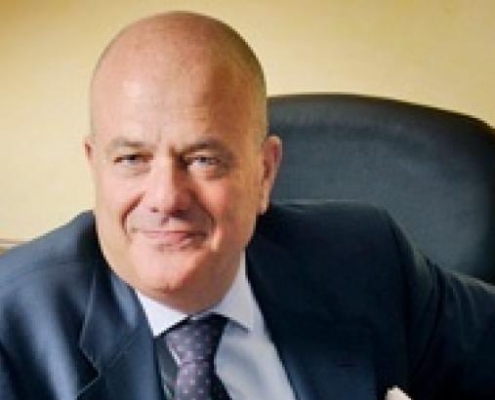
Luciano Sovena
Luciano Sovena
Luciano Sovena was the CEO of the Istituto Luce Spa then Cinecittà Luce Spa taking part in the production and distribution of numerous films. He focuses his presidential duties for the Roma Lazio Film Commission on the incoming and the promotion and agreements of cinematographic co-production between Italy and foreign countries. In Marocco he founded the first Centro Euromediterraneo di Cinematografia, from which the Scuola delle Arti e dei Mestieri del Cinema was conceived. He is a professor of Teorie e Tecniche di Produzione del Cinema e della fiction televisiva, at the Università degli Studi Suor Orsola Benincasa in Naples. He is an expert on regulations aimed at the financial relationship of film production and distribution.
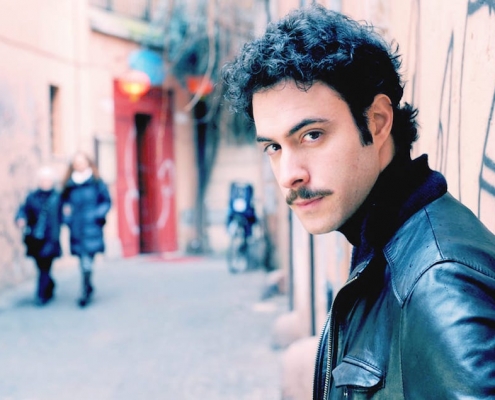
Alessio Vassallo
Alessio Vassallo
Alessio Vassallo was born in Palermo in 1983. In 2003 he moved to Rome where he studied for his diploma at Accademia Nazionale d’Arte Drammatica Silvio D’Amico. He started out co-starring with Beppe Fiorello in the film for Rai La vita rubata. He became popular thanks to Il giovane Montalbano; he then continued his studies in New York and has been part of the international series I Borgia. His cinematic debut was in I baci mai dati, then Viola di Mare, L’ultimo Re and in 2015 we saw him as one of the protagonists of Fino a qui tutto bene by Roan Johnson, winner of the Festival del Cinema in Rome. He is currently touring theatres with the show Dieci storie proprio così, about identified but forgotten victims of organized crime. He was also on the set of Il giorno più bello, the first feature by Vito Palmieri. He is obsessed with the Palermo football team… Joy and pain.
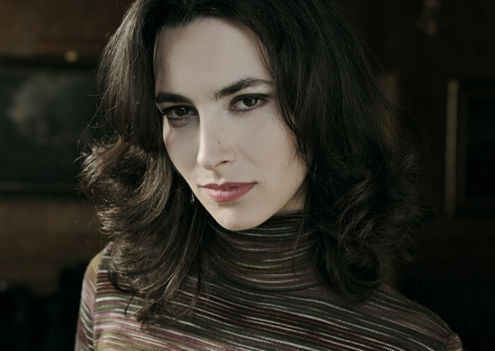
Daniela Virgilio
Daniela Virgilio
Daniela Virgilio was born in Rome in 1986. In 2006 she made her film debut in Il bosco fuori by Gabriele Albanesi. In 2007 she graduated from the Centro Sperimentale di Cinematografia in Rome. She became known to the audience through the TV series Romanzo criminale. She continues her career acting in various films such as Immaturi (2009) by Paolo Genovese, Third Person (2012) by Paul Haggis and Questioni di karma (2016) by Edoardo Falcone. She has recently participated in the TV series Un passo dal cielo.
SNCCI Jury
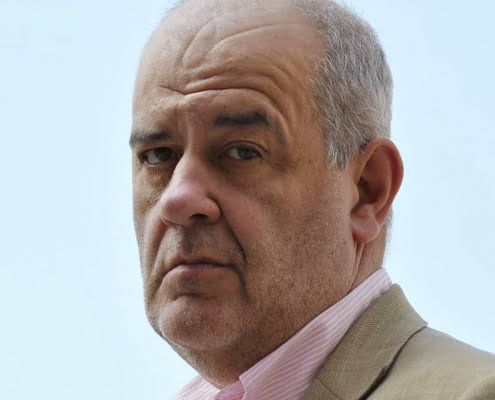
Adriano De Grandis
Adriano De Grandis
Venice, 1955. As a professional journalist, Adriano first worked as an editor on the Sports Pages, before moving on to the Performance Pages. He has followed the world’s biggest sporting events and most important film festivals. He has collaborated on Segnocinema for 25 years, and he worked as a selector for Venice International Film Critics’ Week from 2005 to 2008. He is a great food lover, and he writes for some of the best known gastronomic guides. He is also a singer, and has published a CD his previously unknown songs called Anche I pesci parlano d’amore.

Marianna Cappi
Marianna Cappi
Marianna Cappi was born in Ostiglia and lives in Rome. Film critic and screenwriter, she graduated in the History of Cinema, doing her thesis on Serge Daney and she has a degree from the Centro Sperimentale di Cinematografia. She wrote the film Amori Elementari, directed by Sergio Basso, and the homonymous novel for Salani. She writes for the daily paper La Voce di Mantova, for the web portal MyMovies and for the weekly publication FilmTv. She is one of the organizers of the Mantova Film Festival. She has collaborated on the collective volumes Il personaggio cinematografico (Gorizia, Transmedia, 2008) and Il grande cinema italiano by Roy Menarini (Atlanta and Bologna editions). She teaches at RUFA, Rome University of Fine Arts.
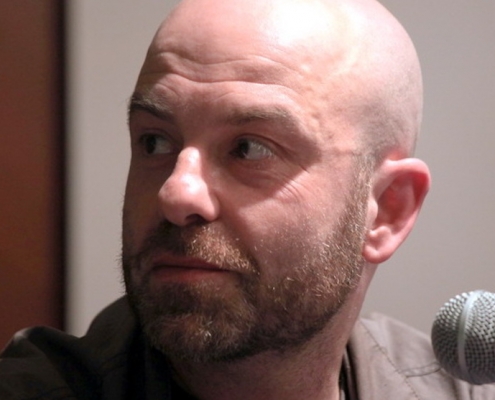
Simone Emiliani
Simone Emiliani
Born in Nuoro in 1969. He is the Artistic Director of Valdarno Cinema Fedi, and the Editorial Supervisor of Sentieri Selvaggi where he has worked since 1994. He also collaborates with Cineforum, Filmcritica and Filmparlato. Within the various pubblications he has worked on Kevin Costner, I mondi imperfetti di un eroe per caso (ed.Sorbini), Walter Hill, written with Mauro Gervasini (ed. Falsopiano), Dustin Hoffman (ed. Gremese) and Fughe da Hollywood, written with Carlo Altinier and edited by Le Mani. Since 2007 in Arezzo he has organized, with Cineforum 2, the review Gli Invisibili. From 1994 to 2004 he was the disciplinary coordinator of the Enciclopedia del cinema, at the Istituto dell’Enciclopedia Treccani. He has also curated the Annuario del cinema 2000-2001 (ed. Lindau) with Federico Chiacchiari and was artistic director the mental health festival Lo Spiraglio in Rome.

